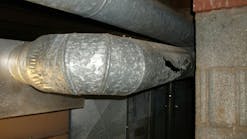National HVAC services provider ARS/Rescue Rooter, Memphis, TN, is on a campaign to improve the fuel efficiency of its entire fleet of vehicles. It's entered into an arrangement with Reading Truck Body, Reading, PA, for 100 Classic Service Vans (CSV). The CSV is nearly 1,100 pounds lighter than the current steel service vans ARS has been using.
Mike Baessler, ARS/Rescue Rooter's director of purchasing and fleet, says the decision to explore new vehicles was the result of escalating fuel prices during 2008. He estimates the company will see a 9 to 12% reduction in fuel consumption per vehicle, and reduced maintenance costs.
Baessler visited the Reading Body Works facility late in 2008, where he observed Reading's manufacturing processes. He also explored how using the CSV could help reduce costs associated with fuel consumption, payload, tire wear and maintenance.
“After we considered those factors, they presented a proposal for a price that was virtually the same as what we've been paying for a similar vehicle,” Baessler says. He also asked Reading engineers to custom-design an air deflector to be positioned above the cab. This was done to improve wind resistance and further improve fuel savings.
Before going forward with the decision, Baessler wanted some feedback from ARS/Rescue Rooter general managers located in California. “A prototype of the vehicle was delivered and they provided feedback to Mike Snyder, Reading's vice president of sales, and John Holley, truck engineer and designer, who saw to it that the feedback was incorporated into the final design,” Baessler says.
Most of those changes were minor, but ARS/Rescue Rooter wanted a vehicle that would run as economical and efficiently as possible and contribute to the efficiency of field technicians.
“We operate 24/7, with emergency services in the middle of the night, so it's not unusual for our technicians to be out at 3 a.m. on a service call. We want to make the vehicle as efficient as possible,” Baessler says.
ARS/Rescue Rooter plans to put the CSV up against the current fleet in head-to-head fuel efficiency comparisons. ars.com








